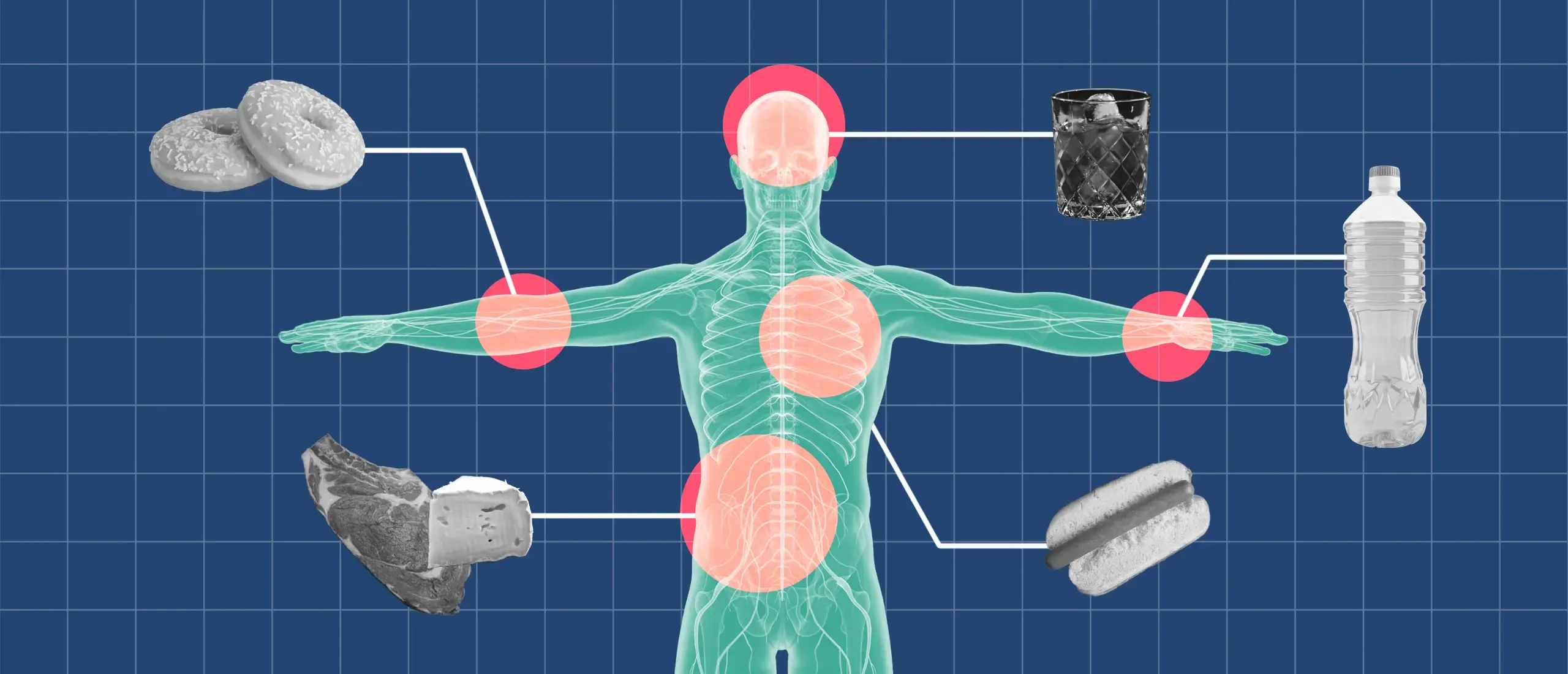Skip These 5 Inflammation-Causing Foods, Say Dietitians
- By Rebekah Harding
- January 11, 2024
C
hronic inflammation is no joke—it can be the cause of your joint stiffness or gastrointestinal issues, and it may even contribute to poor mental health (1). Thankfully, you can lower inflammation levels by making certain lifestyle changes, like cutting back on inflammation-causing foods.
Registered dietitians Megan Hilbert, M.S., R.D.N., and Alyssa Simpson, R.D.N., explain exactly how inflammatory foods can wreak havoc on your body, and provide helpful suggestions on what to eat more of instead.
About the Experts:
Megan Hilbert, M.S., R.D.N. is a registered dietitian at Top Nutrition Coaching, who specializes in gut health nutrition, IBS, and intuitive eating. She also enjoys exploring the connection between the gut-brain axis with her clients.
Alyssa Simpson, R.D.N., C.G.N., C.L.T., is a registered dietitian and owner of Nutrition Resolution. She specializes in gastrointestinal-related nutrition needs for people with SIBO and IBS.
What Is Inflammation? And How Can It Affect Your Health?
Inflammation gets a bad rap, but not all inflammation is bad.
When you injure yourself or get sick from a virus, your immune system triggers acute inflammation around the affected area(s). For example, if you sprain your wrist at the gym during a clean and press gone wrong, your immune system sends out inflammatory cells and cytokines—or small proteins that tell other immune cells to begin the healing process—to your injury to help you heal (2).
Chronic inflammation occurs when your body’s defense system doesn’t know when to stop fighting irritation from food, autoimmune disorders, toxins, untreated injury or illness, and Zombie cells (1). It can cause prolonged damage to the body, and contribute to chronic disease such as cancer and type II diabetes. It may even play a role in the development of certain mental health conditions (1).
5 Foods That Cause Inflammation
Food can trigger chronic inflammation in a couple different ways, Hibert and Simpson say.
“Certain foods can alter your gut bacteria, which can eventually trigger chronic inflammation,” Hilbert explains. “Other times, inflammation is caused by foods, like saturated fats or trans fats, that release inflammatory proteins into the bloodstream.” Once these proteins are in your blood, inflammation can travel to other parts of your body and lead to issues like heart problems, joint pain, and brain fog, says Simpson.
Here are five of the biggest dietary culprits—and how they may impact your health if you don’t dial back on them too.
Omega-6 fats
Omega-6 fatty acids are a type of polyunsaturated fatty acid that’s found in oils like soybean and sunflower. They can be good in moderation, as they may offer benefits for your skin, bones, and metabolism (3). However, eating a higher concentration of omega-6s than omega-3s (which consist of APA, DHA, and ELA fatty acids), may cause inflammation (4).
“Omega-6 fatty acids are a precursor to numerous pro-inflammatory mediators,” Hilbert explains. For context: pro-inflammatory mediators are molecules that—in this beneficial scenario—trigger an inflammation response for immune support or tissue repair. However, too many pro-inflammatory mediators at work can lead to chronic inflammation, though experts aren’t quite sure how.
Refined sugars
Refined sugars are put through a process to remove their impurities and nutrients, making a more intense sweetener (5). You’ll find them in baked goods; sodas and other sugary drinks; and candy—and they may cause inflammation, Simpson says.
“High sugar intake (50 or more grams in one setting) increases inflammatory markers,” Hilbert explains.
Plus, eating a diet that’s high in refined sugars is linked to weight gain, and excess weight is linked to inflammation, Simpson and Hilbert both note. This connection is fueled by insulin resistance—a condition where your cells have a hard time absorbing sugar from your blood—which could lead to high blood sugar and increase your risk of type 2 diabetes (6).
Fatty meat and dairy
Fatty meat, including pork belly, beef ribeye, and short-ribs, and full-fat dairy products are packed with saturated fat, says Simpson, which may also stoke the fire of inflammation.
A study published in a 2020 issue of the International Journal of Tryptophan Research suggests that saturated fat might play a role in activating inflammatory genes in otherwise healthy people (7). Researchers believe that saturated fats “short-circuit” immune cells, causing them to trigger an inappropriate inflammatory response (8).
Processed meats
Processed meats, such as roast beef, sausage, and salami, are key offenders of inflammation, according to Simpson.
A 2022 study in the Journal of Nutrition linked daily intake of processed meats to higher inflammation risk (9). Researchers suspected this is due to the high amounts of saturated fats and nitrites (a type of preservative) that are often found in processed meats.
“Saturated fats and nitrites are associated with higher inflammation in the body,” Simpson says. “Nitrites can spark inflammation by triggering oxidative stress—an increase in unstable molecules in your body that can cause damage to cells, proteins, and DNA.”
Alcohol
Inflammation is just one of the negative health outcomes associated with frequent alcohol consumption.
“Alcohol can harm your stomach, liver, and other organs by changing the balance of bacteria in your gut, making the intestinal lining more permeable, and affecting the immune system in the gut,” Simpson explains. Intestinal permeability—or leaky gut—is the hypothetical digestive condition where the intestinal lining lets bacteria and toxins leak into your bloodstream (10).
“Over time, this can lead to increased inflammation in the body, raising the risk of problems like liver disease and heart issues,” Simpson says.
Eat More of These Foods to Reduce Inflammation
According to Hilbert, “the best way to reduce inflammation is through dietary shifts.” And there’s a good reason the Mediterranean diet continually earns the title as the U.S. News Best Diet—it’s great for reducing inflammation, Hilbert says. She’s right: A 2023 study found that sticking to a Mediterranean diet for just six months can reduce inflammation markers (11).
“This means focusing on a plant-predominant diet filled with whole grains, fruits, vegetables, fats like olive oil,” Hilbert explains. She also recommends eating fish that’s high in omega-3 fatty acids (like salmon and mackerel) and meats that are low in saturated fat (think: chicken and lean pork).
Here’s Hilbert’s Mediterranean-inspired grocery list:
- Whole grains (wheat, barley, oats, millet)
- Berries
- Leafy green vegetables
- Salmon
- Mackerel
- Sardines
- Poultry
- Pork
“Adding in certain spices like turmeric, ginger, cinnamon, black pepper, and cayenne are also packed with antioxidants and other plant compounds that fight inflammation,” Hilbert notes.
References
1. Pahwa, et al (2023). Chronic Inflammation.
2. Hannoodee, et al (2022). Acute Inflammatory Response.
3. Djuricic, et al (2021). Beneficial Outcomes of Omega-6 and Omega-3 Polyunsaturated Fatty Acids on Human Health: An Update for 2021.
4. DiNicolantonio,et al (2021). The Importance of Maintaining a Low Omega-6/Omega-3 Ratio for Reducing the Risk of Autoimmune Diseases, Asthma, and Allergies.
5. Arshad, et al (2022). Replacement of refined sugar by natural sweeteners: focus on potential health benefits.
6. NIH. Insulin Resistance & Prediabetes.
7. Berg, et al (2020). Saturated Fatty Acid Intake Is Associated With Increased Inflammation, Conversion of Kynurenine to Tryptophan, and Delta-9 Desaturase Activity in Healthy Humans.
8. Robblee, et al (2016). Saturated Fatty Acids Engage an IRE1α-Dependent Pathway to Activate the NLRP3 Inflammasome in Myeloid Cells.
9. Papier, et al (2022). Higher Meat Intake Is Associated with Higher Inflammatory Markers, Mostly Due to Adiposity: Results from UK Biobank.
10. Aleman, et al (2023). Leaky Gut and the Ingredients That Help Treat It: A Review.
11. Clark, et al (2023). Adherence to a Mediterranean Diet for 6 Months Improves the Dietary Inflammatory Index in a Western Population: Results from the MedLey Study.














